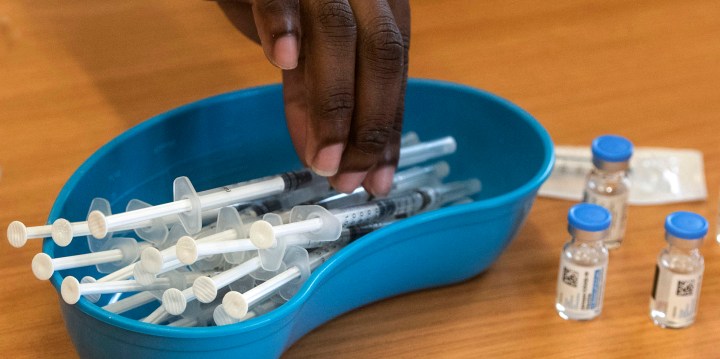AFRICAN BIOTECH OP-ED
Proposed healthcare ‘New Deal’ should help set scene for this week’s Agoa Forum talks

The Africa ‘New Deal’ proposed by the Africa CDC is a direct response to the Covid-19 crisis which taught us the important lesson that national interests come first and that the delivery of essential products to Africa was too slow and too late.
This week, South Africa’s Department of Trade, Industry and Competition hosts the Africa Growth and Opportunity Act (Agoa) Forum in Johannesburg’s Nasrec conference centre. Enacted into law in 2000, Agoa provides duty-free access for more than 6,000 products into the US market. While African countries do not have to provide similar access to their markets for US goods, to be eligible, African countries must abide by broad measures of governance and accountability.
The forum is an annual event designed to gather stakeholders from Africa and the US, including government officials and corporate and civil society leaders, to assess the impact of the trade relationship between the United States and the nearly 40 Agoa-eligible African countries. The forum alternates between US and African venues, and this is the first time it has been held in South Africa, which is the country that has benefited the most from Agoa.
Among the topics for discussion will be “Local Manufacturing” of health products, including vaccines, therapeutics, and diagnostics. This discussion comes on the heels of the African Centre for Disease Control’s (Africa CDC) “New Deal,” which seeks to enhance Africa’s capacity to combat infectious diseases through greater surveillance, response and collaboration between government and the private sectors.
Included in the New Deal is a focus on the supply of the above-mentioned health products. The Africa New Deal is a direct response to the Covid-19 crisis, which taught us the important lesson that national interests come first and that the delivery of essential products to Africa was too slow and too late.
However, in the interim, some successful efforts have been made to increase African research and manufacturing capacity. Earlier this year, the Institut Pasteur de Dakar and the South African Medical Research Council cohosted the first Biomanufacturing Workforce Development Workshop, and both the Gates and Mastercard Foundations are providing nearly $100-million to ramp up Africa’s production of vaccines.
In Kenya, Moderna is establishing an mRNA vaccine production facility and in South Africa, Pfizer and South Africa’s Biovac (which received government support to produce a Covid vaccine) along with Johnson & Johnson are partnering with Aspen Pharmaceutical to produce J&J’s Covid vaccine for the African market.
In Cape Town, Roche Diagnostics has invested in a global genomics sequencing R&D and manufacturing site that supplies the global market in collaboration with the city’s robust research community.
And last, a lab scientist in Botswana was the first to sequence the Omicron Covid variant.
Commercial expectations
However, as we have seen in the past few months with the decline of the demand for Covid vaccines, these ventures have not met commercial expectations, which underscores the risky nature of investments in the biotechnology sector. With the faltering of these single-disease responses, there is some concern that this will diminish ambitions to address the challenge of African manufacturing capacity. However, as we strive to implement this “Africa New Deal,” a few imperatives seem clear.
First, local manufacturing should be replaced with a regional manufacturing approach. The African continent has 55 countries, each of which cannot become manufacturing hubs.
Second, there should be a gradualist approach starting with lower-level manufacturing such as fill-and-finish vaccine production or the manufacture of simple rapid diagnostic test kits before moving to more sophisticated and highly engineered manufacturing activities to build a regional policy environment that paves the way for this needed investment.
Third, attention must be paid more holistically to price sensitivity and investment in health. Why would a health procurement agency in Chad choose a higher-priced and less effective vaccine produced in South Africa over one manufactured in India just because it was made in Africa?
To address these concerns, Africa might consider the following measures:
First, accelerate the completion of the African Continental Free Trade Agreement (AfCFTA) to facilitate the free movement of goods and services across borders.
Second, accelerate the registration of medicines on a continent-wide basis through the African Medicine Agency which was established by the African Union in 2021.
Third, ensure industrial policy is supportive of health policy. The target should be to enhance the wellbeing of Africa’s citizenry economy, not to establish duplicate white elephant manufacturing facilities that employ few people to produce simple products in one country. Rather, the African Union has laid out a vision for regional investment in manufacturing, and countries working together can improve the environment for research and human capacity and evolve the institutional ecosystem gradually to enhance its capacity to meet Africa’s capacity to meet its own needs.
And, the good news is that there are many research institutions and corporations in the US willing to partner with Africa to achieve these goals over the long term. Moreover, as we will see this week at the Agoa Forum, US government institutions such as the Development Finance Corporation and Prosper Africa are willing to provide financing and technical assistance to support Africa in achieving Africa’s “New Deal”.
The scene has been set by the Africa CDC’s “New Deal” and while there are many moving parts, there appears to be a willingness to take the necessary steps so that Africa is fully prepared to respond to the next global health crisis. DM
Anthony Carroll is a retired Adjunct Professor at Johns Hopkins University who has been active in African biopharmaceutical and trade issues for decades.


















 Become an Insider
Become an Insider
Comments - Please login in order to comment.